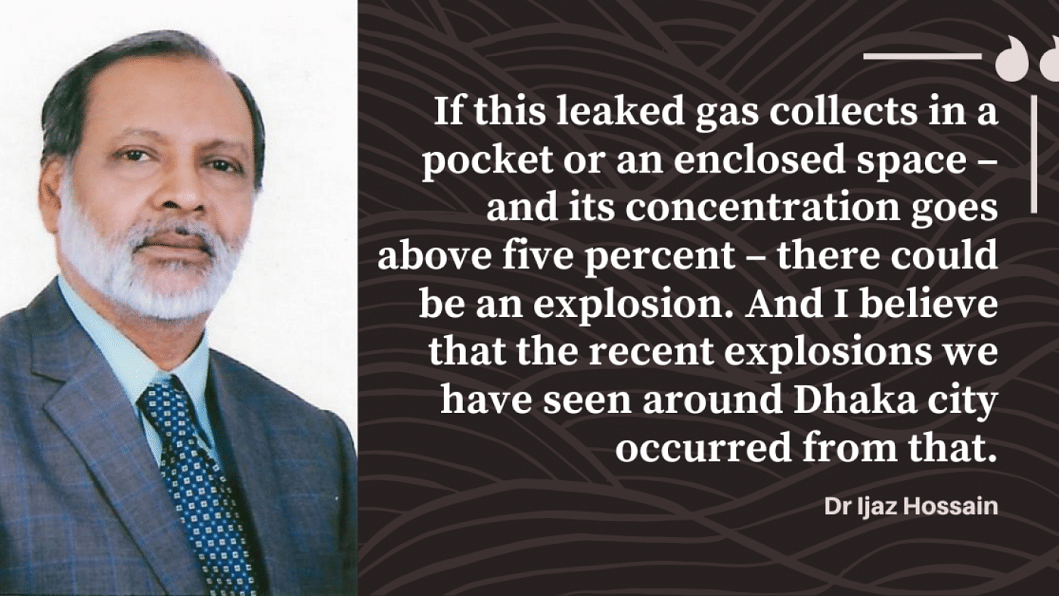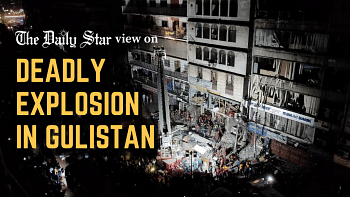Titas doesn't have the budget to fix all gas leaks – so it ignores them

Dr Ijaz Hossain is former dean of the Faculty of Engineering at Bangladesh University of Engineering and Technology (Buet). In an interview with Eresh Omar Jamal of The Daily Star, he talks about the hazardous state of Dhaka's gas distribution system and how that is putting people's lives at major risk.
On April 24, people from different parts of Dhaka started to panic fearing there had been a gas leak. How vulnerable is our gas distribution system to such leaks and how much danger is it putting people in?
The first thing we need to accept and understand is that these leaks are there. It is pointless to deny or hide it. So, if these leaks are there, why did people smell the odorant mixed with the gas on April 24, and not on other days? Titas itself has answered that question. Normally, we have a gas shortage problem, which leads to low gas pressure in different parts of Dhaka, and sometimes people also complain that they are not getting any gas. Since all industries closed down during Eid, gas consumption went down drastically, leading to higher-than-usual gas pressure.
Before natural gas enters any city, it has to pass through a facility called city gate station (CGS). On the upstream side of CGS, you have very high pressure from gas fields. Its function is to lower the pressure before supplying gas to the city – you can't give 1,000 PSI of gas to the city. Because gas pressure from gas fields is usually low, the CGS is adjusted in a way that allows enough gas to enter; without this adjustment the pressure would be too low to maintain gas supply throughout the city. When the pressure on the entry side increased, more gas started to enter the city, and more gas started to escape through the leaks. During normal times, gas does escape through the leaks. But due to the low pressure, we cannot detect it as, after dispersion in the surrounding air, the amount of gas that leaks out is not detectable by our nose.
Anecdotally, we know that Titas' lines have many leaks. This incident just outright proved it. But we had proof before, too. For example, we have all seen gas coming out of these lines at high pressure in flood-affected areas. And, several years back, there was a study done under the carbon credit programme "Clean Development Mechanism (CDM)" – because this is a greenhouse gas which is being emitted – of many risers (and pipes) at consumers' premises which found that a large proportion of those had leaks.
The number of leaks in Dhaka city is staggering – pointing to the fact that the pipelines are old or were constructed poorly. So, gas is leaking continuously. If this leaked gas collects in a pocket or an enclosed space – and its concentration goes above five percent – there could be an explosion. And I believe that the recent explosions we have seen around Dhaka city occurred from that. It's not always that gas can build up to that point in an enclosed place. And even if it did, it's possible that, fortunately, there was no source of ignition to cause an explosion. But we now have proof showing that these leaks are serious and dangerous.
Is there a way to have a system in place that could detect leaks before people are put in harm's way?
It is one thing when gas leaks into someone's kitchen because they might have meters, detectors, etc showing that it's leaking. But what about the pipeline? There are definitely ways to detect leaks there, and Titas knows when the pipeline is leaking. But they don't have the budget needed to fix them all – so they ignore it.
There are many technologies for detecting leaks. Imagine a line has two meters at two ends. If there are no leaks, there won't be any loss when gas is flowing – whatever passes through one meter must pass through the other one. Pressurising a line by closing all outlets and observing pressure can detect leaks. These are simple standard methods of detecting a gas leak.
Where should the push for this investment come from? While this may be monetarily costly, what about the cost in terms of the lives we've paid with by ignoring this issue?
We have already experienced a few big explosions. For example, the one at the Narayanganj mosque and also at Moghbazar. But we could witness even bigger ones. As per some sources, many other recent explosions (although the government has not confirmed this) also happened from leaks. So, all leaks in gas pipelines need to be plugged urgently.
Also, these leaks are emitting methane, which is 24 times worse than carbon dioxide in terms of global warming. So, while the government is up in arms about climate change, it is ignoring this emission.
In our country, an adequate maintenance budget is rarely provided. Public sector utilities are more interested in new projects. When you create a budget, you need to set aside resources for the maintenance of old and new projects – as well as provide funds for the protection of workers and the general public. One needs to invest in protecting these pipelines so that they last for 30 years and also provide money to replace the pipes once their useful life (as specified by manufacturers) is over – even if the pipes still look okay and have no leaks, just to be safe.
Through the April 24 incident, we came very close to some major accidents – and luckily people promptly complained and Titas managed to take corrective actions on time. However, there was some negligence here as well. At the CGS, if they had detected the high pressure upstream (because of factories and industries being closed) resulting in high pressure downstream, this would not have happened – and it should never have happened. So, the authorities, including the energy minister, need to sit down and find urgent solutions.
So, what we see happening are all outside of the domain of good practices when it comes to safety.
Can the lack of sufficient investment for maintenance and everything you mentioned be described as part of a governance failure?
Yes, absolutely. It is also the attitude that is the problem. The authorities responsible for different projects are not putting enough emphasis on safety – both that of people and of the environment. We are literally seeing crashes, explosions, and fires every day, many of which result from disregarding safety guidelines. Why? Because infrastructures are not well-maintained and, in some cases, not properly constructed.
How do we change this mindset? In many countries, had such deaths from explosions occurred, we would see criminal cases being filed, perhaps being followed by prosecution. Could such accountability improve things?
Our judicial system needs to take proactive steps in this regard and hold people responsible. There needs to be adequate budgetary allocation for safety. This propensity of wanting to build new infrastructure, while ignoring the upkeep of the systems we already have in place, is a damaging one. Until things break down – taking lives with it – we rarely take any actions to replace the asset. So, what does that illustrate? That these lives are dispensable? This should never be acceptable.
So, yes. We have to hold people, organisations, and even the government accountable or criminally liable. But for that, all the courts have to operate with a mindset that people's lives must always take precedence over and above everything else.

 For all latest news, follow The Daily Star's Google News channel.
For all latest news, follow The Daily Star's Google News channel. 






Comments